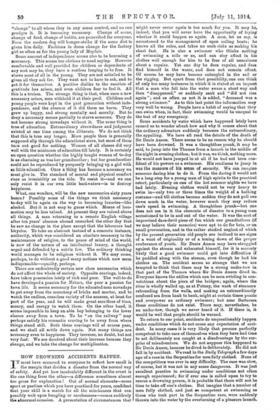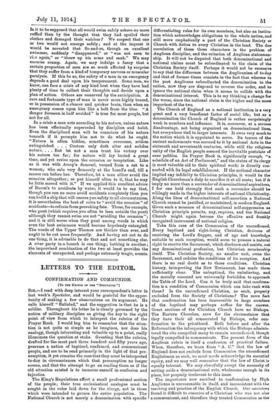HOW DROWNING ACCIDENTS HAPPEN.
IT must have occurred to everyone to reflect how small is the margin that divides a disaster from the normal way of safety. And yet how incalculably different in the event is the one thing from the other—a difference sometimes almost too gross for explanation ! Out of normal elements—some sport or pastime which you have practised for years, confident that your skill is a match for all the mischances that can possibly wait upon bungling or carelessness—comes suddenly tha abnormal occasion. A permutation of circumstances that might never occur again is too much for you. It may be, indeed, that you will never have the opportunity of trying whether it could happen so again. A man, let us say, is accustomed to the manageraeut of open sailing boats; be knows all the rules, and takes no such risks as making his sheet fast. He is also a swimmer who thinks nothing of swimming a mile or so, and can stay afloat in his clothes well enough for him to be free of all uneasiness about a capsize. Yet one day he does capsize, and does find himself in the water, and does not remain afloat. Of course he may have become entangled in the sail or the rigging. But apart from that possibility, one can think of only too many instances in which it is stated at an inquest that a man who fell into the water swam a short way and then "disappeared," or suddenly sank and "did not rise again "; and as often as not it is added, " deceased was a strong swimmer." As to this last point the information may very well be wrong. People have a habit of saying that they can swim when, in fact, their swimming would be unequal to the test of any emergency.
Some accidents by water which have happened lately have caused us to wonder afresh bow and why it comes about that the ordinary adventure suddenly becomes the extraordinary, the appalling. We have all read the details of the death of Sir Denis Anson. There seems to be no reason why he should have been drowned. It was a thoughtless prank, it may be said, to jump into the Thames from a launch in the middle of the night in evening clothes; but it was, we think, nothing more. He would not have jumped in at all if he had not been con- fident of his powers as a swimmer. His readiness to jump in was the measure of his sense of security. We can imagine someone daring Lim to do it. From the daring it would not be a long step for a young man of high spirits to the practical retort, particularly on one of the hot summer nights we have had lately. Evening clothes would not be very heavy to swim in—only two or three times the weight of a bathing costume—and till clothes become sodden they do not pull one down much in the water, however much they may reduce one's speed in swimming. A thoughtless prank—but one does not see in it the elements of disaster to a young man accustomed to be in and out of the water. It was the sort of improvised dare-devil piece of fun which our grandfathers (if we may believe their memoirs) were apt to do for bets, or on small provocation, and in the rather studied neglect of which by the present generation old people are inclined to see signs of a want of originality or of a toning down of the proper exuberance of youth. Sir Denis Anson may have struggled against the stream and exhausted himself, for it is scarcely likely that a good swimmer could get into difficulties if he paddled along with the stream, even though he had his clothes on. The accident seems so strange that we are tempted to think that there may be a strong under-tow in that part of the Thames where Sir Denis Anson dived in. Everyone knows the eddies which can be seen swirling in con- volutions about the piers of the bridges; again, where the river is wholly walled up, as at Putney, the wash of steamers rebounding from the walls, and making an extraordinarily confused sea from bank to bank, might at certain times puzzle and overpower an ordinary swimmer; but near Battersea, these conditions do not exist. There may, nevertheless, be an under-tow, though we never heard of it. If there is, it would be well that people should be warned.
To return to our point, accidents do unquestionably happen under conditions which do not cause any expectation of acci- dent. In many cases it is very likely that persons perfectly competent to take care of themselves when they have had time to act deliberately are caught at a disadvantage by the sur- prise of misadventure. We do not suppose this happened to Sir Denis Anson, because he dived in deliberately. He did not fall in by accident. We read in the Daily Telegraph a few days ago of a race in the Serpentine for men fully clothed. None of the competitors was ever in any difficulty. The race was slow, of course, but it was not in any sense dangerous. It was just excellent practice in swimming under conditions not often enough experienced; for if ever one is called upon to try to rescue a drowning person, it is probable that there will not be time to take off one's clothes. But imagine that a number of men fully clothed, and just as competent at swimming as those who took part in the Serpentine race, were suddenly thrown into the water by the overturning of a pleasure launch.
Is it to be supposed that all would swim safely ashore no more ruffled than by the thought that they Lad spoiled their clothes and damaged their watches ? We suspect that one or two would not emerge safely ; and at the inquest it would be narrated that So-and-so, though an excellent swimmer, suddenly "disappeared," or "was not seen to rice again," or "threw up his arms and sank." We may surmise cramp. Again, we may indulge a fancy that a certain proportion of men are so much affected by surprise that they suffer from a kind of temporary nervous or muscular paralysis. If this be so, the safety of a man in an emergency depends a good deal upon his temperament. Some men, we know, can face a crisis of any kind best when they have had plenty of time to collect their thoughts and decide upon a plan of action. Others are unnerved by the anticipation. A rare and fortunate type of man is never more highly braced, or in possession of a clearer and quicker brain, than when an emergency comes upon him like a bolt from the blue. "A danger foreseen is half avoided" is true for most people, but not for all.
In a crisis a man acts according to his nature, unless nature has been effectually superseded by discipline and habit. Even the disciplined man will be conscious of his nature beneath if it prompts him not to do what he ought. "Nature is often hidden, sometimes overcome, seldom extinguished. . . . Custom only doth alter and subdue nature. . . . But let not a man trust his victory over his nature too far; for nature will lay buried a great time, and yet revive upon the occasion or temptation. Like as it was with Aesop's damosel, turned from a cat to a woman; who sate very demurely at the board's end, till a mouse ran before her. Therefore, let a man either avoid the occasion altogether; or put himself often to it, that he may be little moved with it." If we applied this excellent advice of Bacon's to accidents by water, it would be to say that, though you can no more avoid accidents completely than you can build a ship that will ensure you safety in all circumstances, it is nevertheless the best of rules to " avoid the occasion" of accidents—to refrain from provoking fate. Those, for example, who punt (which requires you often to lean outside the punt) although they cannot swim are not "avoiding the occasion"; and it is still worse when they punt among weeds in which even the best swimmers would become hopelessly entangled. The weeds of the Upper Thames are thicker than ever, and ought to be cut more frequently. And having set out to do one thing, it is advisable to do that and not something else. A river party in a launch is one thing; bathing is another; the improvised combination of the two at least provides the elements of unexpected, and perhaps extremely tragic, events.







































 Previous page
Previous page